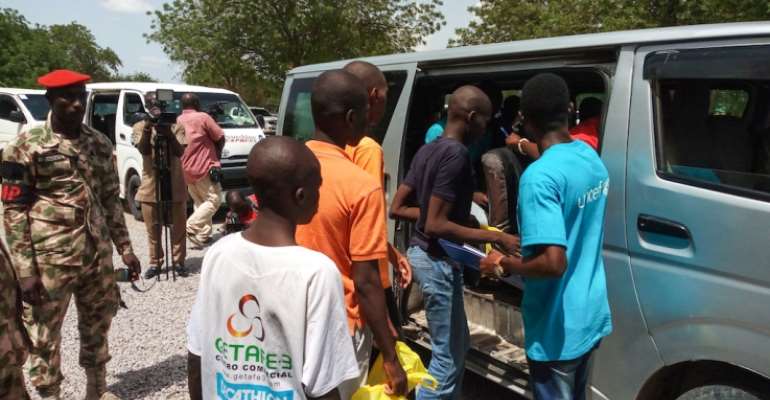833 children Associated With Armed Group Released From CJTF Borno

UNICEF welcomes the release of 833 children from he Civilian Joint Task Force (CJTF) alleged to have been engaged in Maiduguri, Northeast Nigeria fight against Boko haram insurgency in the last nine years of the boko haram crisis as part of its commitment to end and prevent the recruitment and use of children.
This is the first formal release of children from the CJTF since September 2017 when the group signed an action plan committing to put measures in place to end and prevent child recruitment following a listing in the annexes of the UN Secretary-General’s Annual Report for Children and Armed Conflict for the recruitment and use of children.
Mr. Pernille Ironside, the Deputy Representative of UNICEF Nigeria and the Co-chair of United Nations Country Task Force on Monitoring and Reporting on grave child rights violations (CTFMR) during the handing over between the CJTF Lawyer, Barrister Yusuf Gumda and UNICEF Friday in Maiduguri said the release of these children from CJTF shows commitment to implement the provisions of the Action Plan and to uphold international humanitarian law, human rights laws as well as other regional and national legislations, protecting children’s rights.
“This is a significant milestone in ending the recruitment and use of children, but many more children remain in the ranks of other armed groups in either combat or support roles. We call on all parties to stop recruiting children and let children be children", Ironside said.
It will be recalled that since the Action Plan was signed, members of the CTFMR initiated a joint field verification exercise to ascertain the presence and association of children within the command structures and ranks of the Civilian Joint Task Force.
And as at today, a total of 1,469 children (1,175 boys and 294 girls), associated with the Civilian Joint Task Force have been identified within the city of Maiduguri.
UNICEF have also continued to work closely with state authorities to support the implementation of re-integration programmes for the children released today as well as others affected by the ongoing conflict.
However, since 2017, UNICEF has supported the social and economic reintegration of more than 8,700 children released from armed groups, helping trace their families, returning them to their communities, and offering them psychosocial support, education, vocational training and informal apprenticeships, and opportunities to improve their livelihoods.
The UN Secretary General’s Annual Report on Children and Armed Conflict listed parties to conflict who commit grave violations against children in situations of armed conflict, including recruitment and use of children.
In 2016, the CJTF was listed in the annexes of the Secretary General’s Annual Report for Children and Armed Conflict for the recruitment and use of children.
Similarly, following the listing, UNICEF, in its role as Co-chair of the United Nations Country Task Force for the Monitoring and Reporting on grave violations against children, has been working with the group and Nigerian authorities to develop an Action Plan which was signed in September 2017.
While through the Action Plan, the CJTF commited to put in place a number of measures to end and prevent child recruitment and use. Identifying and releasing all children within the group’s ranks and instructing its members not to recruit or use children in the future are examples of such measures.
UN Security Council resolutions 1539 (2004), 1612 (2005), 1882 (2009), 1998 (2011) and 2225 (2015) on Children and Armed Conflict established measures and tools to end grave violations against children, through the creation of a monitoring and reporting mechanism, and the development of action plans to end violations by parties listed in the annexes of the Secretary General’s Annual Report on Children and Armed Conflict.
An action plan which is a signed commitment that allowed the United Nations to support a party to conflict listed in the annexes of the Secretary General’s Annual Report on Children and Armed Conflict by laying out concrete and time bound measures it must take to end and prevent the recruitment and use of children, as well as other grave violations.
Measures requested in the action plans usually include, but not limited to, the issuance of military orders prohibiting the recruitment and use of children, criminalization of the recruitment and use of children.
The release was also for all the children in the ranks of security forces and the establishment of programmes to support their reintegration into civilian life, as well as the inclusion of age verification mechanisms in recruitment procedures and the strengthening of birth registration systems.
